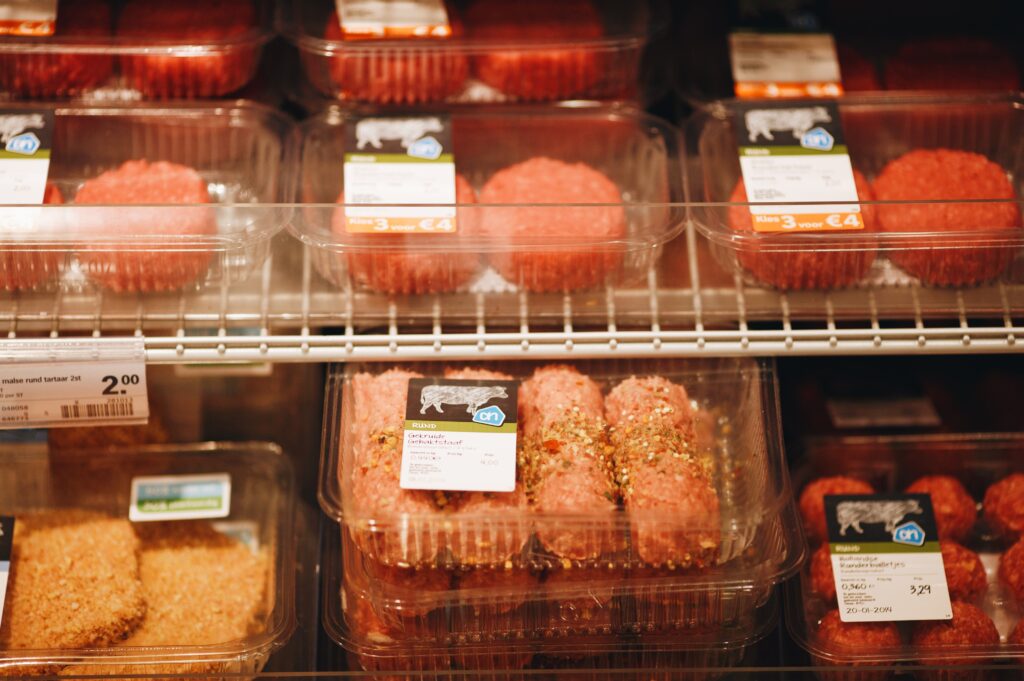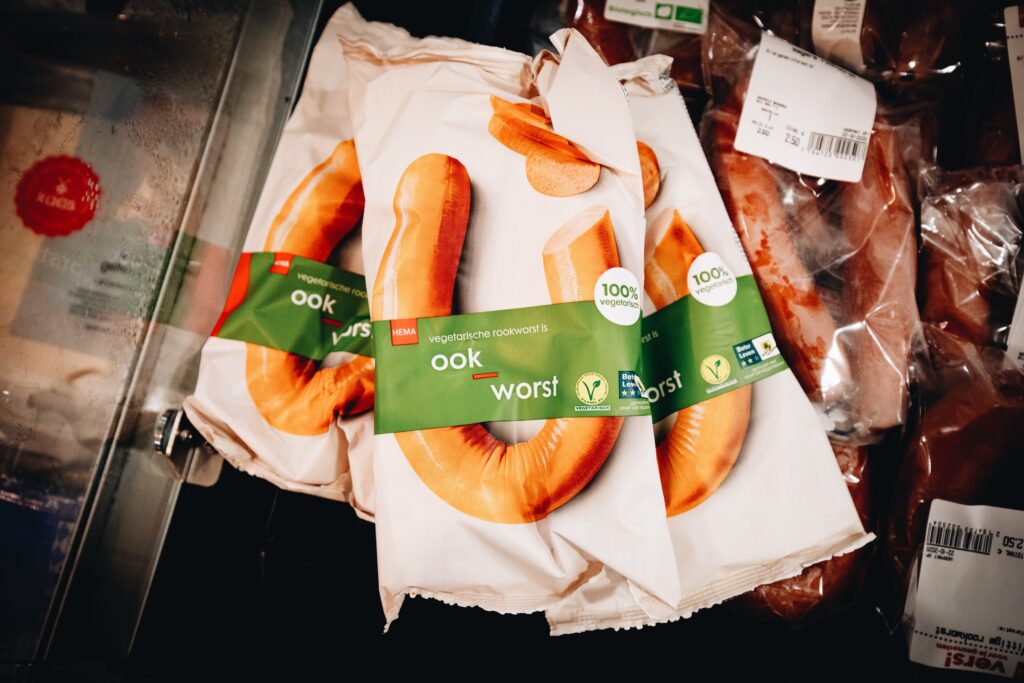The Dutch government aims to reduce meat consumption over the next decade as part of the Netherlands’ climate change targets; but a new study shows that up to seventy percent of Dutch people want their government to do even more to promote plant-based food.
Plant-based food advocacy group ProVeg Netherlands commissioned the poll at the end of 2020, and Amsterdam-based voter research bureau Kieskompas carried out the study itself. It included 8,575 participants, the vast majority of which supported increasingly ambitious and directive action by the Dutch government in reducing the production and consumption of meat and dairy.
Currently, the government is aiming for a 50-50 split between animal and plant-based proteins in Dutch diets by either 2025 or 2030, according to ProVeg. However, the poll indicates that voters are more ambitious, with an average suggested split of 40-60 (in favor of plant-based food) by 2025 — a reduction of approximately 33.3 percent over the next five years.
“This research shows convincingly that not only are Dutch people open to reducing their meat consumption individually, but they want their government to lead on it,” said ProVeg president and CEO Sebastian Joy in a statement sent to LIVEKINDLY.
Overall, 63 percent of the Dutch public are in favor of ProVeg’s 50-by-40 target, which aims for a 50 percent reduction in animal consumption worldwide by 2040.

Vegan Netherlands: climate change, pandemics, and health
The European plant-based food sector, in general, grew by 49 percent in the last two years alone, and the Netherlands reported both increased demand for vegetarian meat and falling animal protein sales. The overall number of vegan meat products in Dutch supermarkets grew by a significant 51 percent between 2017 and 2021.
“Over the past five years The Netherlands have seen an unparalleled increase in consumer interest in plant based alternatives for meat and dairy,” explained Joy. “With these categories showing double- or even triple-digit growth percentages.”
Seventy-two percent of ProVeg’s respondents believe that people should reduce animal products in favor of vegan and plant-based swaps, and 80 percent also believe that this will help reduce the risk of generating zoonotic disease outbreaks following the COVID-19 pandemic.
While 85 percent of participants in the new study believe that diet should remain a personal choice, seventy percent think that the government should encourage plant-based choices, and 13 percent are in favor of restrictions on the eating of animal products.
The Netherlands is not the only country to suggest reducing meat consumption to mitigate climate change, and government councils around the world are promoting plant-based food as both a sustainable and a healthy choice.
A growing body of scientific evidence highlights the health risks and environmental footprint of animal products (and red meat, in particular).

10 policy measures that would help promote plant-based food
These 10 policy measures to promote plant-based food are all favored by the majority of the Dutch voting population. Notably, they are also favored by a majority of those who typically vote for parties less motivated to reduce meat consumption.
For example, while sitting Prime Minister Mark Rutte’s right-wing VVD party has failed to make any strong commitments to reduced meat consumption, its voters agree with seven out of the 10 policy measures listed below — all but two, four, and 10. This indicates that the desire to swap out animal products crosses political lines amongst voters themselves, regardless of current party policy.
“It is increasingly recognized that our food choices are an issue of such diverse global consequence that it transcends individual preferences, and should be at the top of the national and international political agenda,” said Joy.
ProVeg identified this list of ways to encourage plant-based food and reduce animal consumption based on what policies were favored by the Dutch population in general. More than 50 percent of consulted voters support all 10 measures.

Stimulate people to eat more plant-based food
Favored by 72 percent. A recent study published in Science Direct showed that clear labeling on foods significantly encourages consumers to make more sustainable choices. Including those who said they prefer not to know more about the production of their food.
Reduce the number of livestock farmed nationally
Favored by 54 percent. Reducing the number of livestock produced nationally will bring the Netherlands closer to its climate change targets, including a 49 percent reduction in carbon emissions by 2030. According to Statista, more than 100 million animals lived on farms in the Netherlands in 2016.

Ban factory farming
Favored by 60 percent. In addition to its considerable animal welfare criticisms, intensive animal agriculture contributes to climate change, biodiversity loss, and food insecurity. It also negatively impacts marginalized communities and can be a significant vector for illnesses including H1N1 or “swine flu” and other zoonotic diseases, a particular concern for Dutch voters.
Introduce a higher meat tax
Favored by 52 percent. Studies show that taxing meat could help improve human health, including a reduction in chronic preventable diseases. A higher meat tax would also better reflect the impact of animal agriculture on the environment, particularly when directly compared with plant-based proteins.

Ban the heavily discounted sale of animal products
Favored by 75 percent. In 2020, the Dutch House of Representatives received a letter from the cabinet advising an accurate price for meat and more affordable fruit and vegetables. This was based on a proposal from the broad True Animal Protein Price Coalition (TAPP Coalition).
“The coalition has found that too little is paid for meat. This results in negative impact on the climate, deforestation, reduced animal welfare, high healthcare costs and low incomes for farmers,” said Pier Vellinga, chairman of the TAPP Coalition. “A fair, but slightly higher price for meat contributes significantly to the solutions of these problems.”
Meat production is resource intensive and a discounted price is not representative of the full environmental cost of creating animal protein. It also encourages even more intensive production methods, and can perpetuate high-meat diets in wealthy countries.
Overall, meat production has nearly tripled in the last 60 years. According to The World Counts, humans have eaten nearly 90,000,000 tons of meat so far in 2021.
End government subsidies for livestock farming
Favored by 58 percent. In wealthy countries such as the U.S., UK, and the Netherlands, governments subsidize livestock farming. Nearly 20 percent of the EU’s budget is spent supporting animal agriculture, and Europe even provides €200 million (around $235 million) per year to “promote” agricultural products.
Approximately €60 million of this budget has been spent on meat marketing campaigns in recent years, including for controversial products such as veal.

Subsidize vegan and cell-based alternatives instead
Favored by 72 percent. By subsidizing alternatives to animal products, the Dutch government could help promote new, sustainable proteins and hasten price parity between vegan and animal-based meat. This could also help the Netherlands meet its climate change targets.
Increase the availability of vegan options in stores and restaurants
Favored by 80 percent. An often-cited reason to try vegan meat is curiosity, and expanding plant-based ranges help introduce these foods to more people. Both dedicated vegan sections and integrated vegan/animal-based protein sections help encourage flexitarians to try new meat-free options, and enable curious consumers to make direct swaps more easily.

Decrease the availability of animal-based products
Favored by 61 percent. Decreasing the availability of animal products — particularly alongside a simultaneous increase in plant-based options — could also help to encourage different food choices. While a global vegan diet would be optimal for both health and the climate, this kind of change cannot happen overnight, if at all. But a gradual shift from those who can reduce animal products is a step in the right direction.
Limit the promotion of animal-based products
Favored by 58 percent. Ultimately overproduction is the main issue with animal agriculture’s impact on the environment. Back in 2018, one key study found that a reduction in meat production is absolutely essential if we are to mitigate climate change and save the global food system.
Approximately 70 billion animals are farmed for food worldwide every year, and according to Compassion in World Farming, this could double by 2050. Assuming a steady increase year on year, this would mean an additional 23.3 billion animals by 2030 — the final deadline by which we must have halved global emissions.


